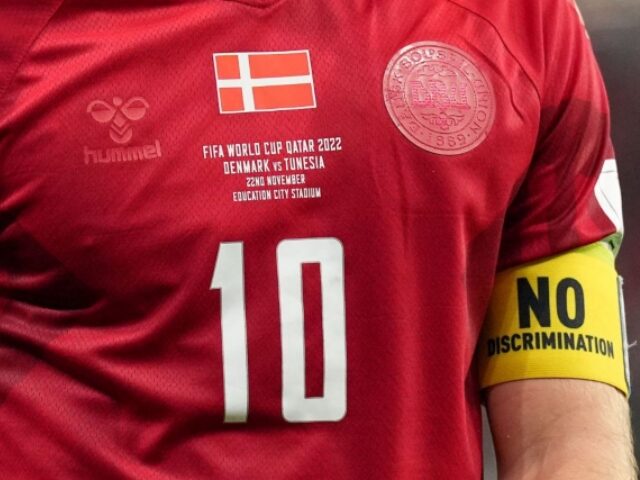The country of Denmark has started to actively consider exiting FIFA alongside other nations over the organization banning the OneLove armbands at the World Cup.
The OneLove armbands were proposed by several nations in protest of the World Cup host country, Qatar, human rights abuses, but FIFA pulled the plug and announced just before the tournament that teams who wear the armband would be shown yellow cards. The captains of seven European nations, including Denmark, had planned to wear the armbands.
On Wednesday morning, Danish FA (DBU) CEO Jakob Jensen told reporters that captain Simon Kjaer could have actually faced more punishment by FIFA had the team worn the armbands.

Players of Denmark greet the fans after the FIFA World Cup Qatar 2022 Group D match between Denmark and Tunisia at Education City Stadium in Al Rayyan, Qatar on November 22, 2022. (Ercin Erturk/Anadolu Agency via Getty Images)
“On November 21, England asked for an emergency meeting with FIFA, who came to the English hotel,” Jensen said. “FIFA said it would at least give a yellow card. There has been discussion about whether there is a legal basis for giving a yellow card, but there is. The penalty could have been a yellow card, that the captain had not come on the pitch or that he was given a ban.”
DBU Chairman Jesper Moller said that Denmark is not among the countries that would support the current FIFA president, Gianni Infantino.
“There are presidential elections in FIFA. There are 211 countries in FIFA and I understand that the current president has statements of support from 207 countries,” Moller told reporters. “Denmark is not among those countries. And we’re not going to be either.”
As to whether Denmark will actually follow through and leave FIFA, Moller said that it will be under discussion with all 55 member states of the DBU.
“It is not a decision that has been made now. We have been clear about this for a long time. We have been discussing it in the Nordic region since August,” he said.
“I’ve thought it again. I imagine that there may be challenges if Denmark leaves on its own. But let us see if we cannot have a dialogue on things,” he added. “I have to think about the question of how to restore confidence in FIFA. We must evaluate what has happened, and then we must create a strategy – also with our Nordic colleagues.”

Jesper Moller, president of Danish FA (DBU) prior to the UEFA Nations League match between Denmark and France at Parken on September 25, 2022, in Copenhagen, Denmark. (Lars Ronbog / FrontZoneSport via Getty Images)
Teams displeased with the FIFA ban resorted to protests of their own while on the field, such as the German team, who covered their mouths ahead of the game against Japan this week.
Earlier this year, FIFA even went as far as to celebrate Pride Month while saying on its website that the World Cup Qatar 2022 will be a “celebration of unity and diversity” as people, regardless of “race, ethnicity, religion, age, disability, sex characteristics, sexual orientation, gender identity and expression” join for a time of friendly competition. FIFA then claimed it took measures to ensure this time of diversity and unity would be properly implemented:
• Training all staff involved in the competition, including public and private security forces, on how to accomplish their tasks in a non-discriminatory manner.
• Insisting hotels and other contractors involved in welcoming LGBTQIA+ fans to Qatar to do so in a manner that respects the rights and privacy of everyone.
• Implementing systems to identify and address instances of homo-, bi- and transphobia and other discriminatory practices inside and outside the stadiums.
• Operating a grievance mechanism through which concerns can be reported to FIFA and addressed by the competent teams.
FIFA did not address the fact that Qatar has strict laws against homosexuality, which could include prison time and potential death for those found guilty.
“Same-sex sexual activity is prohibited under the Penal Code 2004, which criminalises acts of ‘sodomy’ and ‘sexual intercourse’ between people of the same sex. These provisions carry a maximum penalty of seven years’ imprisonment. Both men and women are criminalised under this law,” noted Human Dignity Trust.
According to the Daily Mail, the United States men’s soccer team announced ahead of the tournament that they had “redesigned their crest to incorporate the rainbow flag, in a bid to show solidarity with the LGBTQ+ community.” Singer Rod Stewart also told the Sunday Times he declined an offer of $1 million to perform in Qatar due to the laws.

COMMENTS
Please let us know if you're having issues with commenting.